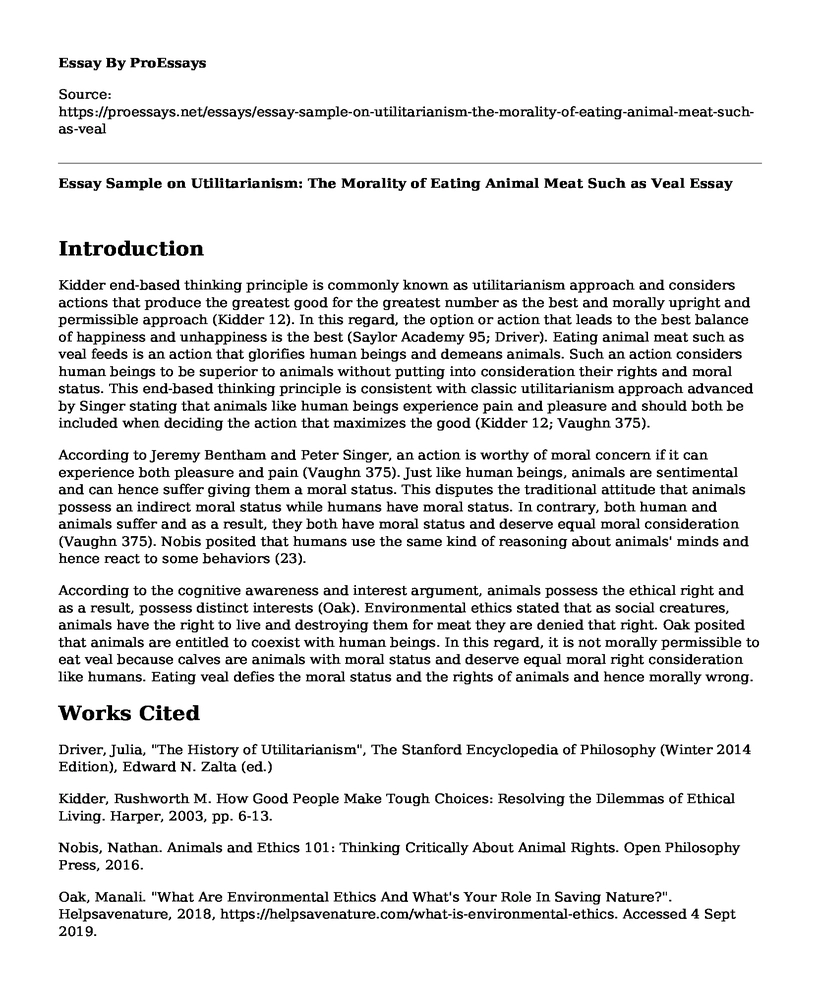Introduction
Kidder end-based thinking principle is commonly known as utilitarianism approach and considers actions that produce the greatest good for the greatest number as the best and morally upright and permissible approach (Kidder 12). In this regard, the option or action that leads to the best balance of happiness and unhappiness is the best (Saylor Academy 95; Driver). Eating animal meat such as veal feeds is an action that glorifies human beings and demeans animals. Such an action considers human beings to be superior to animals without putting into consideration their rights and moral status. This end-based thinking principle is consistent with classic utilitarianism approach advanced by Singer stating that animals like human beings experience pain and pleasure and should both be included when deciding the action that maximizes the good (Kidder 12; Vaughn 375).
According to Jeremy Bentham and Peter Singer, an action is worthy of moral concern if it can experience both pleasure and pain (Vaughn 375). Just like human beings, animals are sentimental and can hence suffer giving them a moral status. This disputes the traditional attitude that animals possess an indirect moral status while humans have moral status. In contrary, both human and animals suffer and as a result, they both have moral status and deserve equal moral consideration (Vaughn 375). Nobis posited that humans use the same kind of reasoning about animals' minds and hence react to some behaviors (23).
According to the cognitive awareness and interest argument, animals possess the ethical right and as a result, possess distinct interests (Oak). Environmental ethics stated that as social creatures, animals have the right to live and destroying them for meat they are denied that right. Oak posited that animals are entitled to coexist with human beings. In this regard, it is not morally permissible to eat veal because calves are animals with moral status and deserve equal moral right consideration like humans. Eating veal defies the moral status and the rights of animals and hence morally wrong.
Works Cited
Driver, Julia, "The History of Utilitarianism", The Stanford Encyclopedia of Philosophy (Winter 2014 Edition), Edward N. Zalta (ed.)
Kidder, Rushworth M. How Good People Make Tough Choices: Resolving the Dilemmas of Ethical Living. Harper, 2003, pp. 6-13.
Nobis, Nathan. Animals and Ethics 101: Thinking Critically About Animal Rights. Open Philosophy Press, 2016.
Oak, Manali. "What Are Environmental Ethics And What's Your Role In Saving Nature?". Helpsavenature, 2018, https://helpsavenature.com/what-is-environmental-ethics. Accessed 4 Sept 2019.
Saylor Academy. The Business Ethics Workshop. Washington, DC: The Saylor Foundation, 2012.
Vaughn, Lewis. Doing Ethics: Moral Reasoning and Contemporary Issues. 4th ed., W. W. Norton & Company, Inc, 2016, pp. 371-380.
Cite this page
Essay Sample on Utilitarianism: The Morality of Eating Animal Meat Such as Veal. (2023, Feb 06). Retrieved from https://proessays.net/essays/essay-sample-on-utilitarianism-the-morality-of-eating-animal-meat-such-as-veal
If you are the original author of this essay and no longer wish to have it published on the ProEssays website, please click below to request its removal:
- Compare and Contrast Essay on Free Will vs. Determinism
- Response to Nel Nodding's Argument in "The Language of Care Ethics"
- Ethical Leadership in Business Essay Example
- Essay Example on Revised IESBA Code of Ethics: Assuring Trustworthy Businesses
- Leadership & Ethics: The Ethical Lens Inventory - Essay Sample
- Achieving the American Dream: A Look at the Possibilities - Essay Sample
- Free Essay Sample on Meta-ethics: Exploring Scope, Foundations, and Status of Morality







